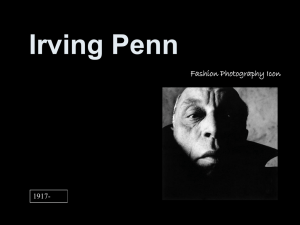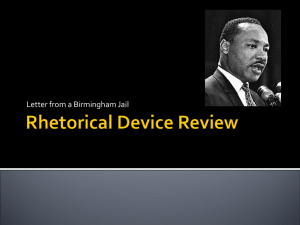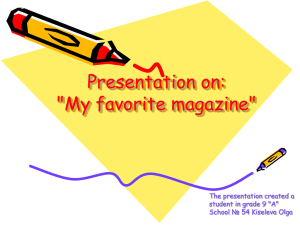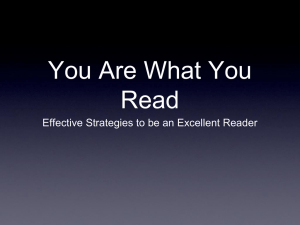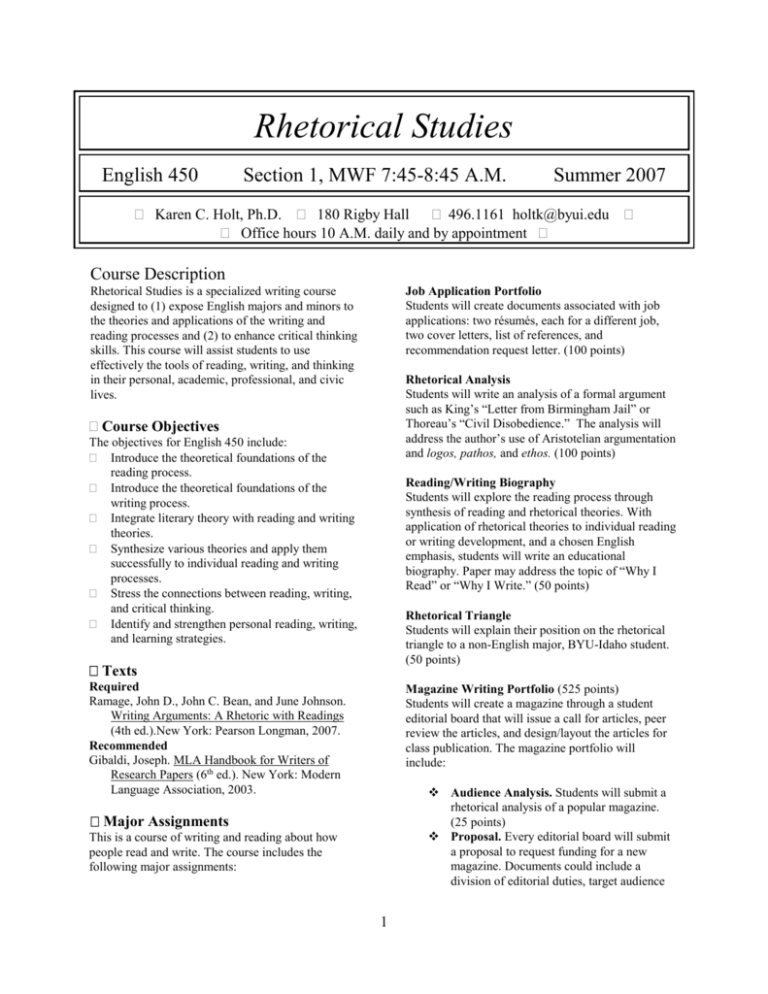
‘‘‘‘‘‘‘‘‘‘‘‘‘‘‘‘
Rhetorical Studies
English 450
Section 1, MWF 7:45-8:45 A.M.
Summer 2007
Karen C. Holt, Ph.D. 180 Rigby Hall
496.1161 holtk@byui.edu
Office hours 10 A.M. daily and by appointment
Course Description
Rhetorical Studies is a specialized writing course
designed to (1) expose English majors and minors to
the theories and applications of the writing and
reading processes and (2) to enhance critical thinking
skills. This course will assist students to use
effectively the tools of reading, writing, and thinking
in their personal, academic, professional, and civic
lives.
Job Application Portfolio
Students will create documents associated with job
applications: two résumés, each for a different job,
two cover letters, list of references, and
recommendation request letter. (100 points)
Rhetorical Analysis
Students will write an analysis of a formal argument
such as King’s “Letter from Birmingham Jail” or
Thoreau’s “Civil Disobedience.” The analysis will
address the author’s use of Aristotelian argumentation
and logos, pathos, and ethos. (100 points)
Course Objectives
The objectives for English 450 include:
Introduce the theoretical foundations of the
reading process.
Introduce the theoretical foundations of the
writing process.
Integrate literary theory with reading and writing
theories.
Synthesize various theories and apply them
successfully to individual reading and writing
processes.
Stress the connections between reading, writing,
and critical thinking.
Identify and strengthen personal reading, writing,
and learning strategies.
Reading/Writing Biography
Students will explore the reading process through
synthesis of reading and rhetorical theories. With
application of rhetorical theories to individual reading
or writing development, and a chosen English
emphasis, students will write an educational
biography. Paper may address the topic of “Why I
Read” or “Why I Write.” (50 points)
Rhetorical Triangle
Students will explain their position on the rhetorical
triangle to a non-English major, BYU-Idaho student.
(50 points)
Texts
Required
Ramage, John D., John C. Bean, and June Johnson.
Writing Arguments: A Rhetoric with Readings
(4th ed.).New York: Pearson Longman, 2007.
Recommended
Gibaldi, Joseph. MLA Handbook for Writers of
Research Papers (6th ed.). New York: Modern
Language Association, 2003.
Magazine Writing Portfolio (525 points)
Students will create a magazine through a student
editorial board that will issue a call for articles, peer
review the articles, and design/layout the articles for
class publication. The magazine portfolio will
include:
Audience Analysis. Students will submit a
rhetorical analysis of a popular magazine.
(25 points)
Proposal. Every editorial board will submit
a proposal to request funding for a new
magazine. Documents could include a
division of editorial duties, target audience
Major Assignments
This is a course of writing and reading about how
people read and write. The course includes the
following major assignments:
1
analysis for the proposed magazine, and
schedule of deadlines. (100 points)
Call for Articles. (25 points)
Research Paper. Editorial boards will
collaborate on researching and writing the
centerpiece article for their magazine. (100
points)
Visual Rhetoric Portfolio. Students will
analyze and demonstrate principles of visual
rhetoric through creating and demonstrating
the layout, design, and advertising for their
magazine. (50 points)
Submitted Articles. Students will answer
the call for articles, and may submit to the
magazines in E450. An A grade requires 2-3
successful submissions and 1500+ words, a
B grade requires 1-2 submissions and 1000+
words, a C grade requires 1-2 submissions
and 750+ words, no successful submissions
earns a D. Students who submit no articles
receive an F. (100 points)
Magazine. (100 points)
Group Grade. (25 points)
should plan to read their favorite lines from the
article. A one-page outline of the lesson plan is due
at the time of the presentation. (20 points)
Senior Thesis/Reflective Report
Students will write an evaluative report of their
English 450 learning experience by integrating
multiple rhetorical genres such as personal narrative,
argumentation, research, and reflection. (100 points)
Participation & Contributions
Participation in classroom discussion and learning
activities will be qualitatively recorded at the end of
each class. Points earned will range from one to three
points.
1 point = student makes a comment or asks a
question (as long as not distracting); one
point no matter the number of comments
2 points = student contributes a really good piece of
analysis or asks a question that makes us
think in a new way
3 points = student offers an excellent analysis and
synthesizes information to reach a
conclusion that was well put together;
comment demonstrates excellent
preparation; timing of comment
contributes to the discussion
At the end of the semester the number of days
participation was recorded will be averaged by the
number of points possible. A student’s goal should be
a semester average of 1.5-2.0 points. (50-75 points
possible)
Critical Reading Artifacts
To demonstrate daily preparation and accountability,
students will create an artifact of their choice for each
day’s assigned reading, and bring it to class: map,
Cornell notes, outline, journal entry, summary, etc.
As part of the Artifact assignment, students will be
assigned to generate two accurate, well-written
summaries of professional readings. Three students
will each write and post on Blackboard a summary
for a day’s assigned reading by 5 P.M. the day before
the reading appears on the syllabus. The three
summaries become the basis for class discussion and
evaluation. The first sentence of a good summary
identifies: (1) the author, (2) the author’s credentials,
(3) the author’s purpose, (4) the title of the work, and
(5) the author’s thesis. Artifacts provide the notes for
a Review of Literature in the final Senior Thesis.
(100 points)
Attendance Requirements
The student has the responsibility to attend class and
to be prepared for class. The only Aexcused@
absences in which work may be accepted prior to
missing class would be for college-approved
activities signed by the appropriate advisor or
teacher. An excuse for a college-approved activity
allows students to submit work BEFORE the absence,
but I make no distinction between an “excused” and
“unexcused” absence. Students may have two class
absences without a grade penalty. With each
absence after two a 1% deduction is taken from the
final grade (four tardies equal one absence). Students
are responsible for saving absence leave to
accommodate unexpected illness or personal/family
leave. If a student misses class, it is a courtesy to
contact the teacher via phone or e-mail, and the
student’s responsibility to contact another student in
the class for make-up material.
Rhetorical Theory Learning Activity
Students will teach to the class the rhetorical theory
from one of the essays they summarize. The summary
posted by the Learning Activity Presenter(s) should
list three discussion questions at the bottom of the
summary. The lesson should include a brief author’s
background—including where the author fits on the
rhetorical triangle—identification of the topic and
thesis, and a summary of the key points. The lesson is
an opportunity to demonstrate oral rhetorical skills,
and the design should involve the class in a writing
exercise that applies the theory to practice. Students
2
Richard Taylor in McKay 158. He will give qualified
students a letter to submit to teachers.
Grading and Evaluation
Final grades are based on the total percentage of
points earned:
A = 94%
B- = 81%
D+ = 68%
A- = 91%
C+ = 78%
D = 65%
B+ = 88%
C = 74%
D- = 62%
B
C- = 70%
F = 60%
= 84%
Academic Honesty
ABYU-Idaho students should seek to be totally honest
in all their dealings. They should complete their own
work and be evaluated for that work. They should
avoid academic dishonesty and misconduct in all its
forms, including but not limited to plagiarism,
fabrication or falsification, cheating, and other
academic misconduct@ (BYU-Idaho Catalog 20052006, 51). In this class, minor offenses will result in
an >F= on the exam or assignment. It may also be
necessary to repeat the work and still receive a
reduced grade for the course. Major offenses
involving premeditated cheating will result in an >F=
for the course and action by the Dean of Students
Office, such as probation or dismissal from school.
Email
Students must have access to BYU-Idaho email. If
students prefer other email servers, students should
arrange with their carriers to forward their campus
email directly to them.
Writing Conferences
Caveat
Most student questions and writing concerns are
handled in the classroom through class or individual
discussion. Students may schedule an appointment
with the teacher or with the Teacher Assistant for
more extended conferencing. Rarely will the teacher
or TA read an entire document during a conference
but rather will assist the student in identifying the
writing frustration and in developing options to solve
the communication problems. Students are
encouraged but not required to conference with the
TA before submitting a final draft.
The teacher reserves the right to make changes in
course content and policy at any time during the
semester or term.
Syllabus
All due dates are bolded and the last name of the
author of essays to be summarized are bolded.
Chapters in Writing Arguments: A Rhetoric with
Readings by Ramage, Bean, and Johnson are listed as
Ramage; articles on Blackboard are alphabetical in
the Reading List by the author’s last name.
Students who wish to conference with the teacher
about a graded paper must meet the following two
conditions (there are no rewrite options to improve a
graded assignment):
Grievance Policy
Elder David A. Bednar taught in the October 2006
General Conference, “Believing that another person
offended us is fundamentally false. To be offended is
a choice we make.” In accordance with instruction
given by the Lord in D&C 42:88, if you believe you
have a legitimate grievance against a teacher, or about
any aspect of a course, you are advised to follow the
official procedure outlined in the BYU-I Student
Academic Grievance Policy, which states that “the
student should initially address the grievance to the
faculty member involved.” To do otherwise is
uncharitable and departs from the Honor Code, which
enjoins us all to observe, where possible, campus
policies and procedures. Consequently, please visit
with me before addressing concerns to a higher
authority. I believe you will find me reasonable,
accommodating, and appreciative.
1. Wait 24 hours before making an appointment
with the teacher.
2. Come to the appointment with a list of rhetorical
strategies to improve the paper. The teacher will
discuss those options with the student.
Special Limitations
In compliance with applicable disability law,
qualified students with a disability may be entitled to
>reasonable accommodation.= It is the student=s
responsibility to disclose to the teacher any special
need they may have before the end of the first week
of class. In order for students to qualify for
>reasonable accommodation= they must contact Dr.
3
Monday
Wednesday
Friday
April 16
Syllabus and course
expectations. Review Job
Portfolio guidelines with
cover letters.
April 18
Bring current résumé to class.
April 20
Classical argument.
Villanueava, “Inglés in the
Colleges” AND Halloran,
“Rhetoric in the American
College Curriculum: The
Decline of Public Discourse.”
April 23
Job Portfolio DUE.
April 25
Ramage Chp1. “Argument:
An Introduction” and Chp. 2
“Reading Arguments” 3-44.
Choose a classical argument
from list on Blackboard to
analyze.
UNIT II: LOGOS/
SUBJECT. What do I
want to say?
Corbett, “Introduction to
Classical Rhetoric for the
Modern Student.”
Choose a classical
argument from list on
Blackboard to analyze.
Introduce UNIT I:
HISTORY OF
RHETORIC
April 27
History of Rhetoric DUE.
Ramage Chp. 4 “The Core of
an Argument” 67, and Chp. 5
“The Logical Structure of
Arguments” 78.
April 30
May 2
Read Ramage Chp. 6 “Using Ramage Chp. 7 “Moving
Evidence Effectively” (logos) Your Audience: Ethos,
942 AND Martin Luther
Pathos, and Kairos” 112,
King “Letter from a
and Chp. 8 “Accomodating
Birmingham Jail” on
Your Audience” 121. Bring
Blackboard.
a hard copy of your
argument to class. Be
prepared to report the
argument format of your
classical argument; by today
you should have an outline
of the argument.
May 4
May 7
Ede and Lunsford,
“Audience
Addressed/Audience
Invoked: The Role of
Audience in Composition
Theory” AND
Ong, “The Writer’s
Audience is always a
Fiction.”
May 11
Classical Argument Analysis
DUE. UNIT III: PATHOS/
May 9
Rose, “The Language of
Exclusion: Writing Instruction
at the University” AND
Goodman Chp. 4.
Bring 24-hour reading
inventory to class for
Goodman Chp 1 AND
Winterowd, “The Rhetorical
Transaction of Reading.”
READER/AUDIENCE.
How do I want to say it?
Bring a copy of a popular
magazine to class AND your
Book of Mormon. In-class
audience analysis due at end of
class.
4
May 14
Moffett, “I, You, It” AND
Britton, “Shaping at the
Point of Utterance.”
May 21
“Why I Read” OR “Why I
Write” paper DUE.
Introduction to research.
Magazine workshop.
May 28
MEMORIAL DAY
HOLIDAY
June 4
Bednar “A Reservoir of
Living Water.”
Bring all artifacts to class.
Writing workshop for Lit
Review of Rhetorical Theory.
Research workshop,
June 11
Research workshop. Editorial
boards meet on their own to
work on research.
First Call for Articles DUE
on Blackboard wiki page.
June 18
Meet in Smith 268.
Magazine workshop.
May 16
Elbow, “How to Get Power
Through Voice.”
Narrate your educational
biography for 15 minutes:
“Why I Read” OR “Why I
Write.”
May 18
North, “The Making of
Knowledge” AND
Bartholomae, “Inventing the
University.”
May 23
Berlin, “Contemporary
Composition: The Major
Pedagogical Theories.”
Fulkerson, “Four
Philosophies of
Composition.”
May 30
UNIT IV: ETHOS/
WRITER.
Berthoff, “The Intelligent Eye
and the Thinking Hand” AND
Ramage Appendix One 27579.
May 25
Scudder “Learning to See” on
Blackboard AND
Berthoff, “A Curious Triangle
and the Double-Entry Notebook
Research workshop.
June 6
Magazine workshop to draft
Proposal. Read Ramage Chp.
9 “Conducting Visual
Arguments” 137 AND Picture
This by Molly Bang, (library
reserve). Take BB Quiz.
June 8
Magazine Proposal DUE,
posted on Blackboard wiki
page by 5 pm.
Brother Allen, guest lecturer,
will speak on the role of the
editor.
June 13
Research draft DUE. Peer
Review—bring copies of all
sources to class.
In class write Informal call for
articles.
June 15
Revised research paper DUE
at start of class.
Magazine workshop.
June 20
Meet in Smith 268.
Magazine workshop.
Second Call for Articles.
5
June 1
“My Position on the
Rhetorical Triangle” DUE.
Research workshop.
June 22
Meet in Smith 268.
Visual Rhetoric presentations.
Last day to take BB quiz on
Bang book.
June 25
Meet in Smith 268.
Magazine workshop.
June 27
Meet in Smith 268.
Magazine workshop.
June 29
Meet in Smith 268.
Magazine peer review. Bring
hard copy of all articles for
editing.
July 2
Magazine workshop.
July 4
HOLIDAY
July 9
Senior Thesis writing
workshop
July 11
Last day of class.
Senior Thesis DUE. Poster
Session preparation.
workshop
July 6
Magazine DUE.
As a group answer 4 ques:
What 3 things did you learn?
What would you do diff? What
is your favorite ad? Favorite
page?
July 13
READING DAY
NO CLASS
Monday July 16 Test Day
7:00-9:00 a.m.
Poster Session to present Chapter V Reflective Conclusion. Each student will have four minutes
to share the visual from their reflective conclusion. Have fun! “Play” with rhetoric. Your
presentation must share from your Reflective Conclusion a clear connection to at least three
theorists, as well as demonstrate strong oral rhetorical skills. Doughnut image, triangle with no
voice (cut off top) and cape, video, pot, illustrated journal, sing a song, etc.
6



